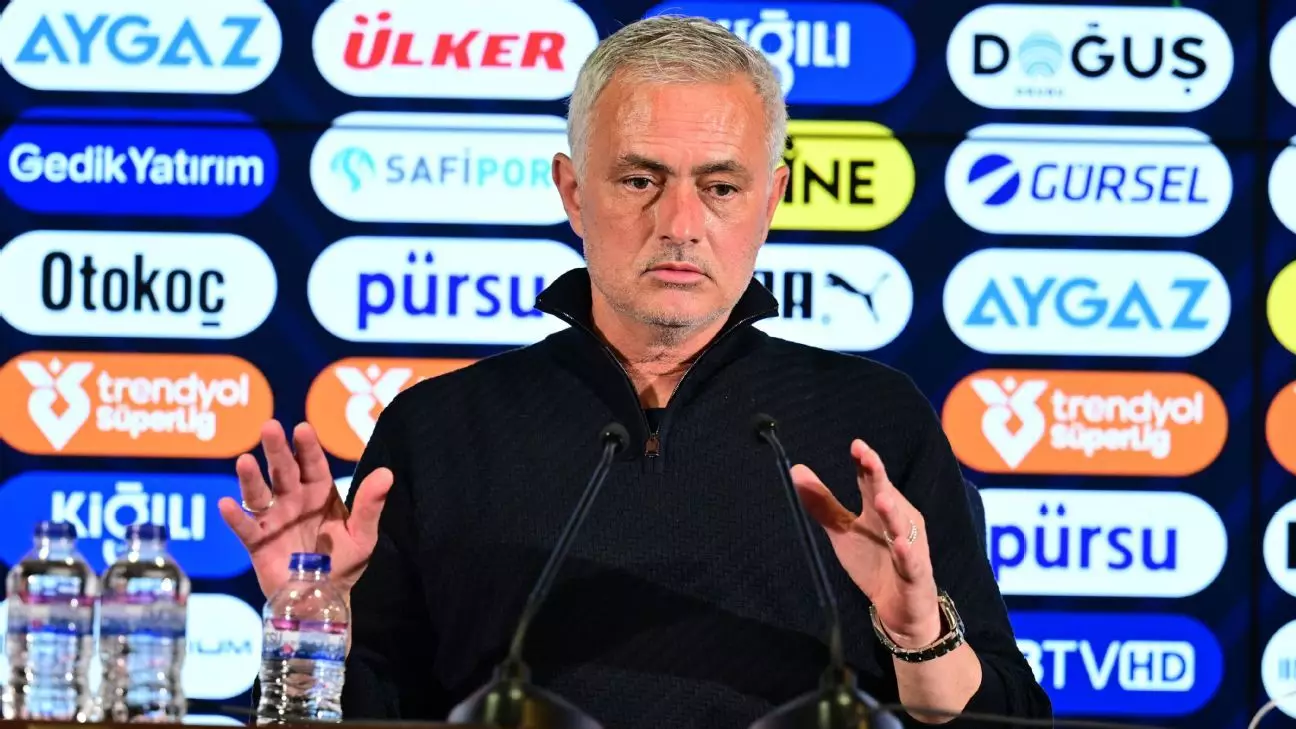When José Mourinho took over as manager of Fenerbahce, expectations soared. He arrived with a two-year contract and a promise to reclaim glory for a club yearning for its first league title in a decade. However, as the dust settles on yet another disappointing derby defeat against Besiktas, Fenerbahce finds itself languishing eight points behind league leaders Galatasaray, staring down the barrel with only four games remaining in the season. Mourinho’s silence regarding his future post-match reveals not just uncertainty but also highlights the immense pressure that comes with managing a storied football club. His refusal to engage with media speculation demonstrates a dual commitment: to respect the club’s internal matters and to shield his players from further scrutiny in a time of crisis.
Defiance Amidst Criticism
Despite the palpable disappointment communicated by fans and pundits alike, Mourinho’s post-match remarks maintain an air of defiance. He articulates a discontent with not just the results but the systemic issues influencing Fenerbahce’s opportunities on the pitch. The Portuguese manager’s claims of a “toxic” atmosphere within Turkish football, where he argues that referees display favoritism towards rivals, casts a shadow over his tenure. The suggestion that an entrenched “system” poses a mental barrier undermines the achievements of his squad, suggesting that Fenerbahce cannot succeed regardless of their on-field capabilities. While some may perceive his statements as excuses, others might view them as a necessary critique to provoke reflection within the league’s governing bodies.
Reflections on Competition
Mourinho’s observations extend beyond mere tactics and game performances; they touch upon a broader discourse of competition and fairness in the Super Lig. Despite his impressive resume, here he struggles against what he perceives as societal and structural limitations. In a recent comment, he demonstrated restraint when addressing Galatasaray’s impending title triumph, opting to focus on his own side’s performance rather than indulge in deriding remarks toward rivals. This approach could be seen as wise, allowing him to shift the narrative back to his team while maintaining his dignity amid frustration. It speaks volumes about his strategic mind; by not inflaming rivalries even further, he ensures that his players are not further burdened by external narratives.
The Burden of Legacy
Mourinho’s legacy is complex, filled with moments of brilliance often juxtaposed against periods of turbulence. His experience places him in a unique position to navigate the choppy waters of criticism, yet the scars of past failures linger. With his acknowledgment of Fenerbahce fans’ frustrations, he embodies a modern approach to leadership—one that accepts accountability while also asserting a vision for growth. “I will never be critical of that,” he mentioned in reference to the fans’ reactions to disappointing results. This remark reflects his understanding of football culture, where passion runs deep, and the immediacy of results holds significant importance. Yet, it is also a call for patience, urging support during a turbulent transition phase.
Contemplating Change
Looking ahead, Mourinho’s situation raises pressing questions about continuity versus change. While he has carved a niche as a tactical mastermind, the inconsistency in results, particularly in critical matchups against domestic rivals, casts doubt on his ability to catalyze immediate reforms necessary for Fenerbahce’s aspirations. The club’s board and, more critically, the fans, may begin to reconsider their faith in his vision if victories remain elusive. His contemplation of internal discussions about next season suggests a pivotal moment for both him and the club. Whether he chooses to stay in the face of adversity or seeks a new challenge elsewhere will dictate not just his future but, potentially, the future trajectory of Fenerbahce as well.
In the world of football, where the fine line between success and failure is razor-thin, Mourinho’s current predicament encapsulates the paradox of competition. Will he rise above the challenges or falter beneath the weight of expectations? Only time will tell how this chapter in Fenerbahce’s storied history will ultimately unfold.

